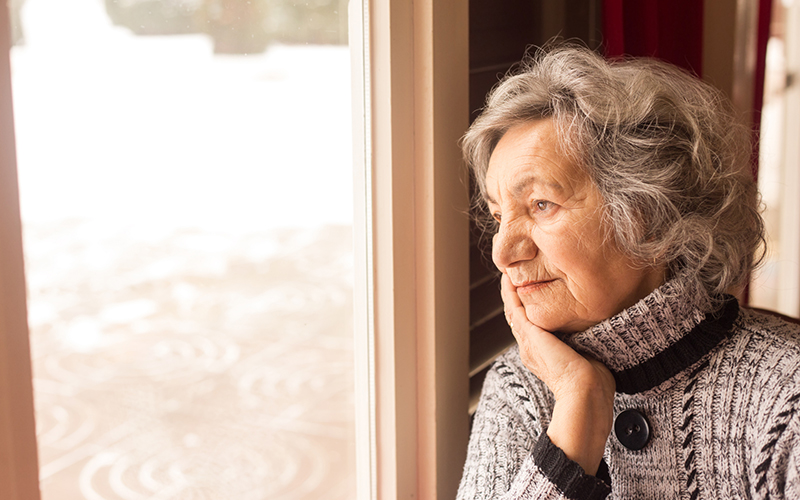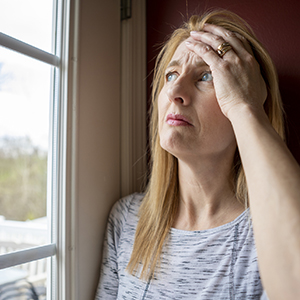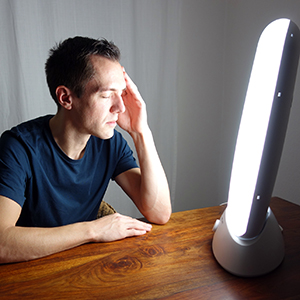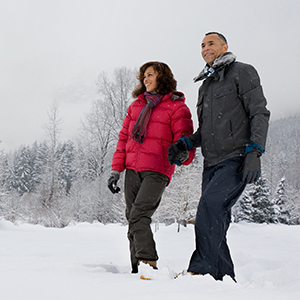Overcoming Seasonal Affective Disorder (SAD)

What is Seasonal Affective Disorder?
Seasonal affective disorder (SAD) is a type of depression. It happens during certain seasons of the year, most often fall or winter. It is thought that shorter days and less daylight may trigger a chemical change in the brain leading to symptoms of depression.
Who is at Risk for SAD?
SAD often starts during adulthood and increases with age. Women are affected more often than men. SAD is rare in people under age 20.
What Causes SAD?
Less sunlight and shorter days are thought to be linked to a chemical change in the brain. They may be part of the cause of SAD.
Melatonin, a sleep-related hormone, also has been linked to SAD. Because our bodies naturally make more melatonin when it’s dark, melatonin levels are higher in the winter months.
What are the Symptoms of SAD?
There are 2 types of SAD:
- Fall-onset. This is also called winter depression. Symptoms of depression begin in the late fall to early winter months. They ease during the summer months.
- Spring-onset. This is also called summer depression. Symptoms of depression begin in late spring to early summer. This type is much less common.
These are the most common symptoms of SAD:
-

Increased sleep and daytime drowsiness
- Loss of interest and pleasure in activities formerly enjoyed
- Social withdrawal and increased sensitivity to rejection
- Grouchiness and anxiety
- Feelings of guilt and hopelessness
- Extreme tiredness (fatigue)
- Decreased sex drive
- Decreased ability to focus
- Trouble thinking clearly
- Increased appetite, especially for sweets and carbohydrates
- Weight gain
- Physical problems, such as headaches
Symptoms tend to come back and then improve at about the same times every year.
How is SAD Diagnosed?
Depression often happens with other conditions such as heart disease or cancer. It may also happen with other mood disorders such as substance abuse or anxiety. For these reasons, early diagnosis and treatment are key to recovery.
A diagnosis of SAD may be made after a careful mental health exam and health history done by a psychiatrist or other mental health provider.
How is SAD Treated?
The treatments for winter depression and summer depression often differ. They may include any of these:
Exposure to Sunlight
Spending time outside or near a window can help ease symptoms.

Light Therapy
If increasing your time in the sunlight isn’t possible, exposure to a special light for a certain amount of time each day may help. No prescription is required for light therapy, though for this particular therapy to be effective, a full spectrum 10,000 lux is recommended. Use an online search to locate a local or web-based store that sells them.
Psychotherapy
Cognitive-behavioral or interpersonal therapy helps change the distorted views you may have of yourself and the environment around you. It can help you improve interpersonal relationship skills. And it can help you identify things that cause you stress and learn how to manage them.
Antidepressants
These prescription medicines can help correct the chemical imbalance that may lead to SAD.
Ideas for Easing SAD Symptoms
- Seek help. If you think you may be depressed, see a healthcare provider as soon as possible. Any therapist who treats depression can provide therapy to a patient who has depression triggered by a change in season (aka SAD).
- Do things that make you feel better. Engaging in enjoyable activities can help put a little pep in your step, such as going to the movies, hanging out with friends, visiting farmer’s markets, cooking new recipes, going for a long walk along a scenic path, or ice fishing. Doing something nice for someone else can also help you feel better.
- Take a vitamin D supplement. “We live around the 45th parallel, and most studies conducted find that of those who live north of the 37th parallel, a large majority of people are vitamin D deficient,” explains Dr. Michael Lucido, PhD, a clinical psychologist with Munson Healthcare Charlevoix Hospital. “Consulting the doctor on your labs would help to assess accurately if this is needed to supplement during the winter months.”
- Set realistic goals. Don’t take on too much. Break large tasks into small ones, set priorities, and do what you can as you can.
- Try to connect with other people and confide in someone. It is often better than being alone and secretive.
-

Enjoy the outdoors. “Just because it’s cold outside doesn’t mean we can’t go out and live well in our four-season area,” Dr. Lucido says. “Find time to stop at the beaches that are now quiet or go to our parks for a hike. Have a bonfire and hot cocoa, keep your bird feeders going and spend time with them. People drive hours or fly to our winter wonderland, so why not pretend to be one of those people and make your own mini trip after errands are completed? Some dogs like huskies, Newfoundlands, and shepherds are begging to find fun in the snow – bundle them up and try a round of fetch.”
- Get regular exercise. Even better: challenge yourself to take some of your workouts outdoors (think snowshoeing, cross-country skiing, or sledding).
- Expect your mood to get better slowly, not right away. Feeling better takes time.
- Eat healthy, well-balanced meals.
- Stay away from alcohol and drugs. These can make depression worse.
- Bring the outdoors inside. Include more plants in your home to help promote oxygen and the feeling of spring and summer.
- Listen to summer music. Listening to your favorite summer tunes can help promote the summer “feel.”
- Delay big decisions until the depression has lifted. Don't make a big change right away, such as getting a new job. Talk it over first with others who know you well. They will likely have a more objective view of your situation.
- Don’t expect a quick fix. People don't often snap out of a depression. But they can feel a little better day by day.
- Try to be patient and focus on the positives. This may help replace the negative thinking that is part of the depression. The negative thoughts will go away as your depression responds to treatment.
- Turn to loved ones. Let your family and friends help you.
Need Help Finding a Counselor?
Check out these nearby resources:
Munson Medical Center Central Access Center (CAC) | 231-925-8351
Talk to a behavioral health specialist about local services, such as counseling. *Please allow 24 hours for callbacks.
Munson Medical Center Behavioral Health Services - Outpatient (Traverse City)| 231-935-6382 or 1-800-662-6766
Offers comprehensive, compassionate, and confidential behavioral health services through a variety of programs.
Cadillac Primary Care – Outpatient Behavioral Health | 231-876-6200
Cadillac Primary Care has Behavioral Health Professionals who will work with you to determine the right type and level of care to restore your health, well-being, and a sense of worth.
Charlevoix Behavioral Health – 2 Locations in Charlevoix and Boyne City | 231-547-8860
Munson Healthcare Charlevoix Behavioral Health provides outpatient behavioral health services, with offices conveniently located in Boyne City and in Charlevoix.
Michigan 211
Dial 2-1-1 to get connected to counseling, treatment programs, support groups, and other resources. Get fast, free, and confidential help, 24/7.
